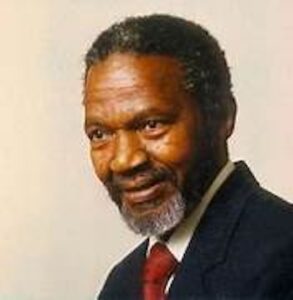
Nthato Harrison Motlana
*Dr. Nthato Harrison Motlana was born on this date in 1925. He was a Black South African businessman, physician, and anti-apartheid activist.
He was born in Marapane, near Pretoria, South Africa. He attended Kilnerton High School in Pretoria and the University of Fort Hare, where he obtained a B.Sc. degree. He also took medicine at the University of the Witwatersrand. Banned by the government for five years, he needed government permission to attend his graduation in 1954. In 1956, he became a resident doctor at Baragwanath Hospital.
He became politically active at Fort Hare when he joined the African National Congress Youth League and later became its secretary. He was tried alongside Nelson Mandela by the Apartheid regime during the Defiance Campaign of 1951–52. Motlana married his wife Sally Maunye in Soweto in 1953. He played a prominent role during the Soweto uprising as a member of the Black Community Program and the Black Parents' Association. This involvement resulted in his detention alongside his wife. Following the collapse of the Soweto Urban Bantu Council, he became a member of the Soweto Committee of Ten in June 1977.
As a founding member of the Black Community Program, its goal was to economically empower Black South Africans. He founded Phaphama Africa Commercial Enterprises, Lesedi Clinic (the first black-owned, private up-market hospital in the country), and Sizwe Medical Aid (the first black-owned medical aid scheme in South Africa). The Sharpeville Massacre portrayed the readiness of the white state to use violence to counter and crush opposition, a willingness that has been seen time and time again since then. Following apartheid, Motlana took a lead role in the formation of the New African Investments Limited, or NAIL, which purchased many previously white-run corporations at below-market value.
These included South Africa's largest newspaper, The Sowetan. Due to his business success, Motalana earned the nickname "Father of Black Economic Empowerment." Motlana served on the boards of Putco, Rand Water Board, Adcock Ingram Group, Sasol, and other civic and academic institutions. He died on December 1, 2008, in Johannesburg, South Africa.